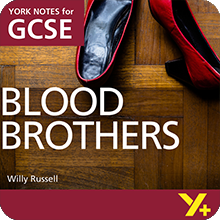Examiner's Notes
You assessed this answer as Grades 8–9.
Hover over the highlighted text to read the examiner’s comments.
Question: ‘Mickey: […] while no one was looking I grew up. An’ you didn’t, because you didn’t need to.’
How does Russell explore different experiences of childhood in the play?
You must refer to the context of the play in your answer.
Mickey explains to Edward that he has had to grow up faster than some children, by taking on adult responsibility. While Mickey must look for a job to support his pregnant wife, Edward can have fun with university friends. He can afford to ‘draw the dole, live like a bohemian’ because he is secure in his qualifications and his background: he does not understand why ‘a job [is] so important’. As Mickey reminds him, Edward has not grown up ‘because you didn’t need to’. In this exchange, Russell makes clear the contrasting expectations of both boys, and the way that they have grown apart since childhood.
It is important that we first see the two boys meet playing in the street: they go to very different schools, and their mothers would never socialise together, even if they were not avoiding each other. It also makes the 1960s setting of the play clearer, when children had more independence than they do today, but also seemed less streetwise.
Russell suggests that it is only in childhood that people can be equal, if only for a time. While they’re playing make-believe games, Edward and Mickey are living on the same terms, in the same world. Because neither of them has responsibilities at that point, they can share the experience.
However, their childhood experiences are still different. Russell makes clear that, back in their homes, back in school, their lives are worlds apart. For instance, it is because she wants a different experience for her child that Mrs Johnstone gives up one of her babies: ‘If my child was raised/In a palace like this one,/(He) wouldn’t have to worry where/His next meal was comin’ from’. She imagines the toys and space he will have, and Mrs Lyons encourages her by reminding her that he would have ‘a bed of his own’. When Mrs Johnstone gives up Edward, the other children accept the death of the little ‘twinny’ without question, as if it’s something that happens – sad but true.
The poverty of Mickey’s childhood is also suggested by offstage voices, for instance at the start, when we hear them calling Mrs Johnstone for food, saying they’re ‘starvin’’ and asking for new things from ‘the catalogue’. By contrast, Edward has whatever he needs, whatever he wants, such as the toy gun his father buys him without a care, or the sweets he shares with Mickey without thinking.
However, Russell reminds us there is more to childhood than material things. Mrs Johnstone is always loving with her children, even if she can’t always feed them; Mrs Lyons is overprotective out of love. Neither boy is neglected emotionally. And when the Lyonses move house, we understand that both boys have lost something enormously important: a best friend. It is a reminder that friends are more important than toys.
